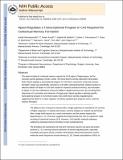Npas4 Regulates a Transcriptional Program in CA3 Required for Contextual Memory Formation
Author(s)
Ramamoorthi, Kartik; Fropf, Robin; Belfort, Gabriel M.; Fitzmaurice, Helen L.; McKinney, Ross M.; Neve, Rachael L.; Otto, Tim; Lin, Yingxi; ... Show more Show less
DownloadLin_Npas4 regulates.pdf (1.713Mb)
PUBLISHER_POLICY
Publisher Policy
Article is made available in accordance with the publisher's policy and may be subject to US copyright law. Please refer to the publisher's site for terms of use.
Terms of use
Metadata
Show full item recordAbstract
The rapid encoding of contextual memory requires the CA3 region of the hippocampus, but the necessary genetic pathways remain unclear. We found that the activity-dependent transcription factor Npas4 regulates a transcriptional program in CA3 that is required for contextual memory formation. Npas4 was specifically expressed in CA3 after contextual learning. Global knockout or selective deletion of Npas4 in CA3 both resulted in impaired contextual memory, and restoration of Npas4 in CA3 was sufficient to reverse the deficit in global knockout mice. By recruiting RNA polymerase II to promoters and enhancers of target genes, Npas4 regulates a learning-specific transcriptional program in CA3 that includes many well-known activity-regulated genes, which suggests that Npas4 is a master regulator of activity-regulated gene programs and is central to memory formation.
Description
available in PMC 2014 May 29
Date issued
2011-12Department
Massachusetts Institute of Technology. Department of Brain and Cognitive Sciences; McGovern Institute for Brain Research at MITJournal
Science
Publisher
American Association for the Advancement of Science (AAAS)
Citation
Ramamoorthi, K., R. Fropf, G. M. Belfort, H. L. Fitzmaurice, R. M. McKinney, R. L. Neve, T. Otto, and Y. Lin. “Npas4 Regulates a Transcriptional Program in CA3 Required for Contextual Memory Formation.” Science 334, no. 6063 (December 22, 2011): 1669–1675.
Version: Author's final manuscript
ISSN
0036-8075
1095-9203